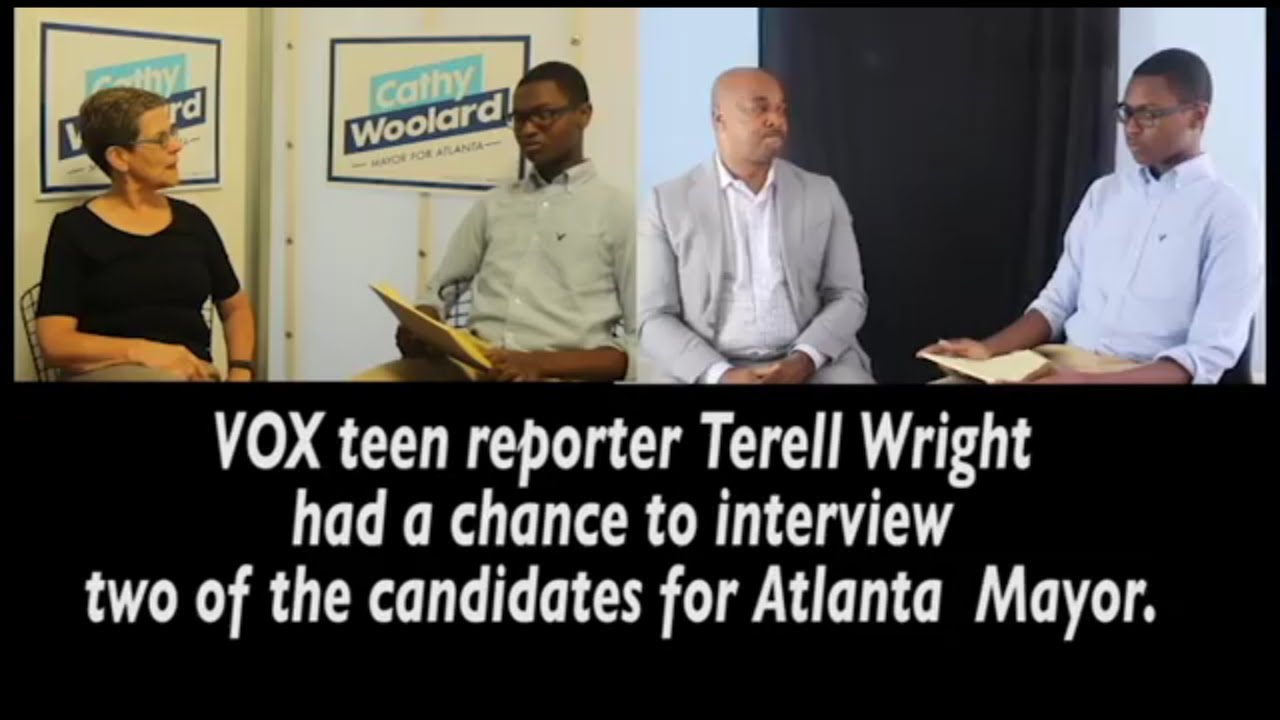The 2017 Atlanta mayoral election is unique. In VOX’s conversations with other teens, many were not even aware we would be choosing our next mayor on Nov. 7. The candidates, meanwhile, are more diverse than ever. Among the nine people in the race, Atlanta City Councilwoman Mary Norwood is currently ahead with 27 percent “of likely voters” who said they’d vote for her, according to a recent 11 Alive poll.
In second place is Atlanta City Council President Ceasar Mitchell at 10 percent. VOX reached out to the Norwood and Mitchell campaigns and while they were open to an interview, scheduling complications kept us from sitting down with them before our deadline. VOX did catch up with two mayoral candidates who are currently within a few percentage points of Mitchell.
Meet Cathy Woolard, a former councilwoman of Atlanta (1998-2002; 2002-2004). Woolard was head of the transportation committee, the first openly gay elected official in Georgia, and an early supporter of the Atlanta BeltLine. The 11 Alive poll listed her at 6 percent of likely voters.
Also, meet Kwanza Hall, who has been an Atlanta city councilman for more than a decade. His parents fought for civil rights and worked with Dr. Martin Luther King, Jr. He has been a long-time supporter of community improvement projects, including the current plan to refurbish Underground Atlanta. Hall is currently at 9 percent in the 11 Alive poll.
Where the candidates stand on the issues:
Homelessness
VOX: According to a 2016 Georgia State University study, more than 3,000 youth are homeless in the Atlanta area. What is your plan to help these kids get off the streets of Atlanta?
Woolard: “Families with children are who we need to be housing first and foremost. We’ve got to get kids stabilized and into a school they’ll stay at for the duration of the school year and hopefully for many years in their school career. When families have children and they’re struggling, the imprint of that could last for the rest of their lives. Our primary objective is to make sure we’re looking out for those families and getting them into stable housing as quickly as we possibly can.”
Hall: “We must identify and not make it a stigma and a negative for families to acknowledge they’re homeless. A lot of young people don’t know they’re homeless. We got to help people get out of that posture and get the services and help and housing that they need. We’re also working with a variety of home builders and developers who are taking over empty apartments. We can repair and renovate [houses] as a city. They [apartments and houses] may cost a few thousand [dollars], but what’s the benefit to society if we can give young people a place to stay so that they don’t have to worry about whether they’re going be able to wake up in a car or under a bridge, so they can go to school and focus on their lives?
Police and Community Relations
VOX: How do you plan the keep the relationship between the people and police positive?
Woolard: “We have to make sure we have enough police officers. I always say when people are tired at work, that’s when mistakes happen. We’re supposed to have 2,200 to 2,500 police officers, but we have less than 1,700 police officers right now. That means people are working overtime; they’re pushing themselves, and when they get into decisions — places where they have to make split-second decisions — they’re not always going be, you know, fresh enough to make those decisions in the way they need to. The more police officers get to know their community, the more they’re going to be able to make judgements based on people they know, versus whatever prejudices or just work on assumptions about how someone is behaving. We also need to have officers de-escalate situations.
Hall: “Trying to bring people together, being a mediator, being a collaborator — a person who knows how to work across lines — that’s natural and true to my DNA.”
Why they want to be mayor
VOX: Why did you decide to get back into politics?
Woolard: “I wasn’t sure I was ever going to run again. I’ve made a lot of things happen, like the Beltline and passing the only civil rights bill in the state. But I got concerned about how the city was growing and the fact that we’ve haven’t expanded our transportation system, and the housing crunch and housing affordability and income inequality made me think the work that I’ve done — especially with social justice, transportation and infrastructure — I’m the right person at the right time to lead the city.”
VOX: Why should you be the next mayor?
Hall: “There is no better person equipped to work with everybody than me.”
Atlanta teens can look forward to hearing from the mayoral candidates at our upcoming VOX Investigates the future of Atlanta community event on Sept. 9. (Details to come.)
In the meantime, you can learn more about each of the mayoral candidates on their campaign websites. And if you’re not registered to vote yet, click here.
The candidates — in order of their rank in the most recent poll:
Terell, 14, attends Walnut Grove High School. He goes to sleep to CNN’s “Anderson Cooper 360” re-runs and wakes up to the network’s “Early Start.”




